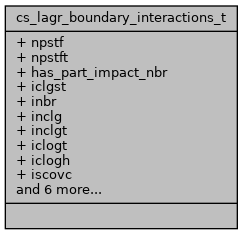|
My Project
programmer's documentation
|
|
My Project
programmer's documentation
|
#include <cs_lagr.h>

Data Fields | |
| int | npstf |
| int | npstft |
| int | has_part_impact_nbr |
| int | iclgst |
| int | inbr |
| int | inclg |
| int | inclgt |
| int | iclogt |
| int | iclogh |
| int | iscovc |
| int | ihdepm |
| int | ihdepv |
| int | ihdiam |
| int | ihsum |
| cs_real_t | tstatp |
| char ** | nombrd |
Boundary interactions statistics parameters
| int has_part_impact_nbr |
activation (=1) or not (=0) of the recording of the number of particle/boundary interactions, and of the calculation of the associated boundary statistics.
| int iclgst |
activation (=1) or not (=0) of the recording of clogging parameters involved in a particle/boundary interaction, and of the calculation of the associated boundary statistics.
| int iclogh |
id for particle consolidation height
| int iclogt |
id for particle deposition time
| int ihdepm |
| int ihdepv |
| int ihdiam |
| int ihsum |
| int inbr |
id for number of particle/boundary interactions
| int inclg |
id for number of deposited particles
| int inclgt |
id for particle deposition part
| int iscovc |
id for particle surface coverage
| char** nombrd |
name of the boundary statistics, displayed in the log and the post-processing files. Warning: this name is also used to reference information in the restart file (isuist =1). If the name of a variable is changed between two calculations, it will not be possible to read its value from the restart file
| int npstf |
Number of iterations during which steady boundary statistics have been accumulated. Useful if isttio=1 and nstist inferior or equal to the current time step. npstf is initialized and updated automatically by the code, its value is not to be modified by the user
| int npstft |
| cs_real_t tstatp |
If the recording of the boundary statistics is steady, tstatp contains the cumulated physical duration of the recording of the boundary statistics. If the recording of the boundary statistics is unsteady, then tstatp = dtp (it is the Lagrangian time step, because the statistics are reset to zero at every time step).
 1.8.16
1.8.16